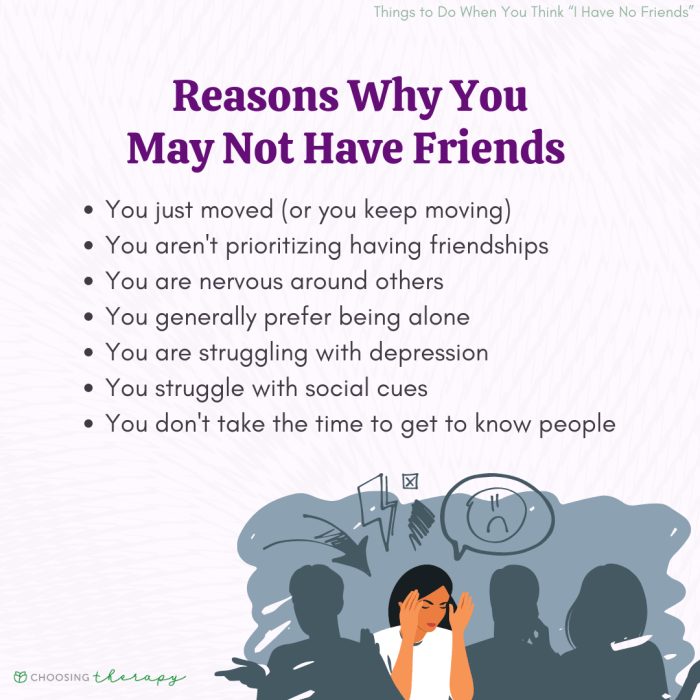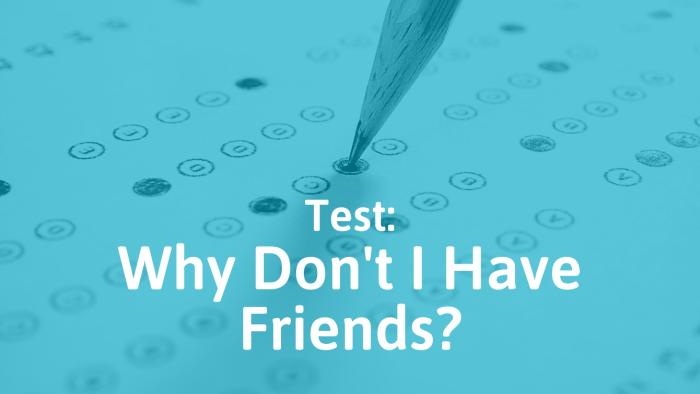Why do i not have friends quiz – Why do I not have friends? It’s a question that many people ask themselves at some point in their lives. If you’re struggling to make and keep friends, you’re not alone. This quiz will help you identify some of the reasons why you may be having trouble and provide some tips on how to improve your social skills.
The quiz covers a range of topics, including your social interactions, communication skills, interests, self-perception, and social skills. By answering the questions honestly, you can get a better understanding of your strengths and weaknesses and develop a plan to improve your social life.
Social Interactions

Navigating social situations can be daunting for various reasons. Past experiences, perceived barriers, and personal characteristics can all shape our interactions with others.
Individuals who have faced negative social experiences in the past may develop social anxiety or a fear of being judged, leading them to avoid social situations altogether.
Perceived Social Barriers
- Feeling different or not fitting in due to race, gender, sexual orientation, or socioeconomic status.
- Perceiving others as being unapproachable or unfriendly.
- Fear of being rejected or ridiculed.
Communication and Expression

Effective communication is crucial for building and maintaining friendships. Let’s explore common challenges and areas for improvement.
- Analyze Communication Patterns: Pay attention to how you interact with others. Are you a good listener? Do you express yourself clearly and assertively? Are there any misunderstandings or miscommunications that occur regularly?
- Expressing Thoughts and Feelings: Expressing your thoughts and feelings openly and honestly can be difficult. Explore any challenges you face in communicating your needs, desires, and emotions.
- Nonverbal Cues and Body Language: Nonverbal cues, such as facial expressions, gestures, and posture, convey a lot of information. Analyze your nonverbal communication and consider how it may be affecting your social interactions.
Analyzing Communication Patterns
To analyze your communication patterns, start by observing your interactions with others. Pay attention to your verbal and nonverbal communication. Are you able to articulate your thoughts and feelings clearly? Do you listen attentively to others? Are there any recurring misunderstandings or miscommunications? Identifying these patterns can help you pinpoint areas for improvement.
Are you wondering why you might not have friends? Perhaps it’s time to take the “Why Do I Not Have Friends Quiz.” After answering a series of questions, you’ll gain insights into your social interactions. And while you’re at it, why not indulge in a refreshing Dutch Bros coffee? Their small, medium, and large sizes are perfect for any caffeine craving.
Afterward, you can revisit the quiz to see if your newfound coffee-fueled perspective sheds any light on your friend situation.
Interests and Activities

Our interests and activities shape our social lives. Engaging in activities that align with our passions provides opportunities to connect with like-minded individuals.
The following table explores the relationship between interests, involvement, and socialization:
| Interests | Level of Involvement | Opportunities for Socialization |
|---|---|---|
| Music | Attending concerts, playing instruments, joining choirs | Meeting musicians, fellow concertgoers, music enthusiasts |
| Sports | Participating in teams, attending games, engaging in fitness classes | Connecting with teammates, opponents, spectators, and fitness enthusiasts |
| Art | Visiting galleries, taking classes, engaging in creative hobbies | Interacting with artists, art lovers, and fellow students |
| Travel | Exploring new places, attending travel events, joining travel groups | Meeting fellow travelers, locals, and individuals with similar travel interests |
| Volunteering | Supporting causes, engaging in community service, participating in non-profit organizations | Connecting with individuals who share similar values and goals |
To increase involvement in activities that align with interests, consider the following:
- Identify local clubs, groups, or organizations related to your interests.
- Attend events, workshops, or classes that cater to your passions.
- Join online forums or social media groups dedicated to your interests.
- Volunteer your time to organizations that support your interests.
- Start a group or activity related to your interests and invite others to join.
Self-Perception and Confidence: Why Do I Not Have Friends Quiz

Self-perception is a fundamental factor shaping our social interactions. It influences how we approach others, communicate our thoughts, and interpret their responses. A positive self-image promotes confidence, openness, and a willingness to engage with others, while a negative self-image can lead to self-consciousness, social anxiety, and difficulty forming meaningful connections.
Negative Self-Beliefs and Limiting Thoughts
Negative self-beliefs and limiting thoughts can significantly hinder socialization. These beliefs, often rooted in past experiences or societal conditioning, can manifest in self-criticism, self-doubt, and a fear of being judged or rejected. They can prevent us from taking risks, expressing ourselves authentically, and forming close relationships.
Building Self-Confidence and Developing a Positive Self-Image
Building self-confidence and developing a positive self-image are essential for healthy social interactions. This involves challenging negative self-beliefs, practicing self-compassion, and engaging in activities that foster a sense of accomplishment and self-worth. By recognizing our strengths, focusing on our positive qualities, and setting realistic goals, we can gradually build a more positive self-image and increase our confidence in social situations.
Social Skills and Networking

Building and maintaining friendships requires a combination of social skills. These include the ability to initiate and maintain conversations, show empathy and understanding, and actively listen to others.
Social skills are not always innate, and some individuals may need to develop or refine them. This can be done through practice, observation, and feedback from trusted sources.
Networking
Expanding social networks and meeting new people is crucial for building friendships. This can be done through various strategies, such as:
- Joining clubs or organizations that align with interests.
- Attending social events and gatherings.
- Volunteering or participating in community activities.
- Taking classes or workshops to meet people with similar interests.
- Using social media to connect with potential friends.
Support and Resources

Building and maintaining friendships is essential for our well-being. However, for some individuals, making and keeping friends can be challenging. Fortunately, there are various sources of support and resources available to assist individuals in improving their social interactions and building meaningful relationships.
Friends and Family, Why do i not have friends quiz
Friends and family can provide a strong support system for individuals struggling with social difficulties. They offer emotional support, encouragement, and a sense of belonging. Spending time with loved ones, engaging in shared activities, and confiding in them about personal experiences can help individuals feel more connected and less isolated.
Therapists and Counselors
Therapists and counselors can provide professional guidance and support for individuals facing social challenges. They can help individuals identify the root causes of their difficulties, develop coping mechanisms, and practice social skills in a safe and supportive environment. Therapy can be particularly beneficial for individuals who have experienced trauma or have underlying mental health conditions that affect their social interactions.
Online Communities and Support Groups
Online communities and support groups provide a platform for individuals to connect with others who share similar experiences or interests. These groups can offer a sense of belonging, reduce feelings of isolation, and provide opportunities for social interaction. They can also be a source of information, resources, and support for individuals navigating social challenges.
Social Skills Workshops and Programs
Various workshops and programs are available to help individuals develop social skills and build friendships. These programs typically focus on teaching practical strategies for initiating and maintaining conversations, building rapport, and navigating social situations. They can be particularly beneficial for individuals with social anxiety or other social difficulties.
FAQ Compilation
What are some of the reasons why I may not have friends?
There are many reasons why someone may not have friends. Some of the most common reasons include social anxiety, communication difficulties, lack of self-confidence, and negative self-perception.
What can I do to improve my social skills?
There are many things you can do to improve your social skills. Some helpful tips include practicing active listening, making eye contact, and being yourself. You can also try joining a club or group that interests you, or volunteering your time to a cause you care about.
How can I make lasting friendships?
Making lasting friendships takes time and effort. It’s important to be patient and to put yourself out there. Try to meet new people and make an effort to get to know them. Be yourself and don’t be afraid to be vulnerable.
With time and effort, you can build lasting friendships that will enrich your life.
